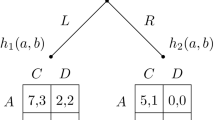Abstract
The paper points out that in dynamic games a player may be better-off if other players do not know his choice of strategy. That is, a player may benefit by not revealing (or not pre-determining) the choice of his action in an information set he (thereby) hopes will not be reached. He would be better-off by exercising his ``right to remain silent'' if he believes –- as the empirical evidence shows –- that players display aversion to ``Knightian uncertainty''. In this case, a player who behaves strategically, may wish to avoid revealing his strategy. This is true under various interpretations of the notion of ``strategy profiles''.
Similar content being viewed by others
REFERENCES
Binmore, K. (1987), Modelling rational players: Part I, Economics and Philosophy 3: 179–214.
Camerer, C. and Weber, M. (1992), Recent developments in modelling preferences: Uncertainty, and Ambiguity Journal of Risk and Uncertainty, 5(4): 325–370.
Dow, J. and Werlang, S. (1994), Nash equilibrium under knightian uncertainty, Journal of Economic Theory, 64(2): 305–324.
Ellsberg, D. (1961), Risk, ambiguity, and the savage axioms, Quarterly Journal of Economics 75: 643–669.
Fudenberg, D. and Levine, D. (1993), Self-confirming equilibrium, Econometrica 61(3): 523–545.
Fudenberg, D. and Kreps, D. (1995), Learning in extensive-form games, I: Self-confirming equilibria, Games and Economic Behavior 8: 20–55.
Goes, E., Jacobason, H. J., Sloth, B. and Tranaes, T. (1998), Nash equilibrium with lower probabilities, Theory and Decision 44: 37–66.
Greenberg, J. (1990), The theory of social situations: an alternative gametheoretic approach. Cambridge University Press.
Greenberg, J. (1996), Acceptable Course of Action in Dynamic Games, Proceedings of the Seventh International Symposium on Dynamic Games and Applications; Filar J., Gaitsgory V., and Imado F. (eds.), 283–298.
Greenberg, J., Monderer, D. and Shitovitz, B. (1996), Multistage situations, Econometrica 64(6): 1415–1437.
Hendon, E., Jacobason, H. J., Sloth, B. and Tranaes, T., (1994), Game theory with lower probabilities. University of Copenhagen, Mimeo.
Kalai, E. and Lehrer, E. (1993), Subjective equilibrium in repeated games, Econometrica 61(5): 1231–1240.
Kissinger, H. (1982), Years of upheaval. Boston Little Brown and Company.
Klibanoff, P. (1993), Uncertainty, decision and normal-form games. Cambridge, MA: MIT, Mimeo.
Knight, F. (1921), Risk, uncertainty, and profit. Houghton-Miffin.
Kuhn, H. W. (1953), Extensive games and the problem of information. Contribution to the Theory of Games Vol. I (pp 193–216). Princeton, NJ: Princeton University Press.
Lo, C. K. (1996), Equilibrium in beliefs under uncertainty, Journal of Economic Theory 71: 443–484.
Osborne, J. M., and Rubinstein, A. (1994), A course in game theory. Cambridge, MA: The MIT Press.
Rubinstein, A. (1991), Comments on the interpretation of game theory, Economtrica 59: 909–924.
Rubinstein, A. and Wolinsky, A. (1994) Rationalizable conjectural equilibrium: between Nash and rationalizability, games and economic behavior, Games and Economic Behavior, 6(2): 299–311.
Author information
Authors and Affiliations
Rights and permissions
About this article
Cite this article
Greenberg, J. The Right to Remain Silent. Theory and Decision 48, 193–204 (2000). https://doi.org/10.1023/A:1005205630723
Issue Date:
DOI: https://doi.org/10.1023/A:1005205630723




